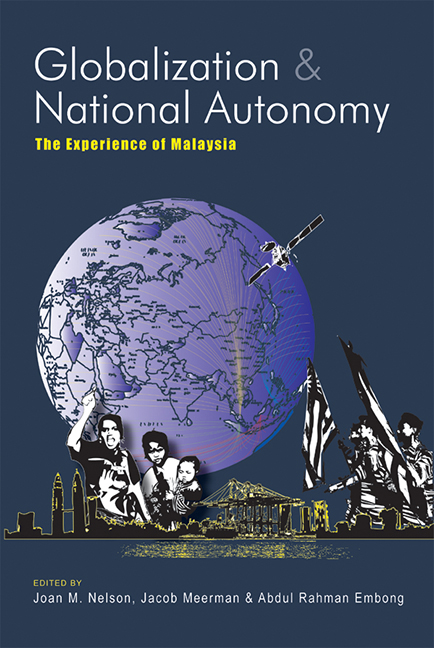Book contents
- Frontmatter
- Contents
- List of Abbreviations
- List of Tables and Figures
- Preface
- Contributors
- Chapter 1 Introduction
- Chapter 2 Developmentalist State in Malaysia: Its Origins, Nature, and Contemporary Transformation
- Chapter 3 The Look East Policy, the Asian Crisis, and State Autonomy
- Chapter 4 The Malaysian Success Story, the Public Sector, and Inter-ethnic Inequality
- Chapter 5 Poverty Eradication, Development, and Policy Space in Malaysia
- Chapter 6 Trade Liberalization and National Autonomy: Malaysia's Experience at the Multilateral and Bilateral Levels
- Chapter 7 Malaysia's Education Policies: Balancing Multiple Goals and Global Pressures
- Chapter 8 Malaysia's Healthcare Sector: Shifting Roles for Public and Private Provision
- Chapter 9 Globalization, Islamic Resurgence, and State Autonomy: The Response of the Malaysian State to ‘Islamic Globalization’
- Chapter 10 The National Culture Policy and Contestation over Malaysian Identity
- Chapter 11 Conclusions
- Index
Chapter 1 - Introduction
Published online by Cambridge University Press: 21 October 2015
- Frontmatter
- Contents
- List of Abbreviations
- List of Tables and Figures
- Preface
- Contributors
- Chapter 1 Introduction
- Chapter 2 Developmentalist State in Malaysia: Its Origins, Nature, and Contemporary Transformation
- Chapter 3 The Look East Policy, the Asian Crisis, and State Autonomy
- Chapter 4 The Malaysian Success Story, the Public Sector, and Inter-ethnic Inequality
- Chapter 5 Poverty Eradication, Development, and Policy Space in Malaysia
- Chapter 6 Trade Liberalization and National Autonomy: Malaysia's Experience at the Multilateral and Bilateral Levels
- Chapter 7 Malaysia's Education Policies: Balancing Multiple Goals and Global Pressures
- Chapter 8 Malaysia's Healthcare Sector: Shifting Roles for Public and Private Provision
- Chapter 9 Globalization, Islamic Resurgence, and State Autonomy: The Response of the Malaysian State to ‘Islamic Globalization’
- Chapter 10 The National Culture Policy and Contestation over Malaysian Identity
- Chapter 11 Conclusions
- Index
Summary
Among the fears and concerns generated by recent globalization, the most basic is the perception that globalization progressively circumscribes the autonomy of governments, nations and peoples. Relentless global market pressures and the ever more pervasive influence and requirements of multilateral organizations and agreements limit the capacity of governments to pursue their own national priorities and their citizens’ preferences. This perception is shared by bitter critics of globalization and by many of those who argue that its potential benefits outweigh its risks.
The charge that globalization reduces national autonomy underpins many other fears and criticisms, since it implies that governments and peoples cannot take countervailing actions to prevent, dilute or compensate for adverse effects. There is now widespread agreement, even among enthusiastic proponents of globalization, that it carries many risks. High on the lists of threats are environmental damage, erosion of workers’ rights, and growing inequality within as well as between nations. In principle, governments could adopt policies to regulate firms and groups that damage the environment, design programmes that promote workers’ welfare, or pursue strategies to reduce inequality. Many governments do attempt such corrective measures. But to the extent that their autonomy is indeed constrained, such countervailing measures cannot be carried far without incurring heavy costs. Globalization's threats to the environment, labour rights, equality, and a range of other goals are severe in part because nations’ autonomy to counter the threats is limited.
Globalization also generates threats that cannot be effectively addressed at the level of action by individual nations. International financial crises, climate change, the cross-border spread of diseases and many other problems largely or partly caused by globalization can only be effectively addressed through international collaboration. Nevertheless, many impacts within nations could be eased by national policies and programs, if governments could take those actions without incurring large costs such as reduced trade, aid or investment; disapproval in regional or global organizations; or possibly even sanctions.
A dissenting strand in the discourse regarding globalization challenges the “loss of autonomy” hypothesis. Since the mid-1990s, a growing number of analysts suggest that the impacts of globalization are filtered through the circumstances, policies and capabilities of each country's society, economy and political system. Hence similar pressures and opportunities have different effects in different countries. This is particularly clear with regard to links between globalization and growth.
- Type
- Chapter
- Information
- Globalization and National AutonomyThe Experience of Malaysia, pp. 1 - 26Publisher: ISEAS–Yusof Ishak InstitutePrint publication year: 2008

